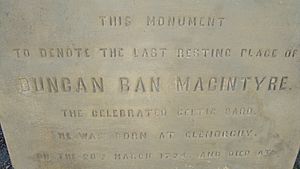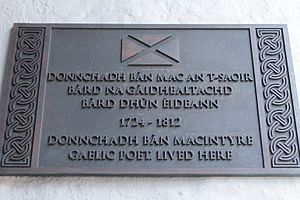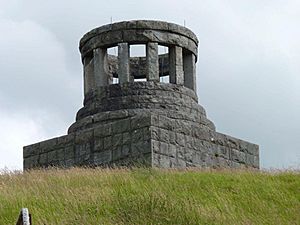Duncan Ban MacIntyre facts for kids

Duncan Ban MacIntyre (born March 20, 1724 – died May 14, 1812) was a very famous Scottish Gaelic poet. He was a big part of a special time for Gaelic poetry in Scotland during the 1700s. People often called him Donnchadh Bàn nan Òrain, which means "Fair Duncan of the Songs."
Contents
Life of Duncan Ban MacIntyre
Duncan Ban MacIntyre was born in a place called Druim Liaghart in Glen Orchy. He had many different jobs during his life. He worked as a soldier, a forester, and even as a police officer in Edinburgh.
Soldier and Poet
As a soldier, he fought for the British side in a conflict called the Jacobite rising of 1745–6. He took part in a battle called the Battle of Falkirk in 1746. He was fighting for another person, and he accidentally lost his sword during the battle. This event later inspired him to write a funny poem about what happened.
When he came back from the battle, the person he fought for refused to pay him because he lost the sword. Duncan wrote a poem to respond to this. The poem made fun of the man and the lost sword.
Life in Edinburgh
In 1767, Duncan moved to Edinburgh. He lived there for the rest of his life. He continued to serve in different groups, like the Breadalbane Fencibles and the City Guard. He retired in 1806. While in Edinburgh, he wrote several poems that won awards. He also tried to become the official poet for a special society, but he did not win.
Duncan Ban's Poetry
Duncan Ban grew up in a place with no schools. He never learned to read or write. He kept all his poems in his memory. At first, people just remembered his poems and shared them by speaking them. Later, a minister named Donald MacNicol wrote them down. Many famous writers have since translated Duncan Bán's poetry into English.
Nature and Influence
Most of Duncan's poems describe nature. Another poet from his time, Alasdair MacMhaighstir Alasdair, greatly influenced his work. Even though there were big conflicts in Scotland during his life, his time as a gamekeeper had the biggest impact on his poetry. He worked for the Duke of Argyll in Argyll and Perthshire.
His most famous work is called Moladh Beinn Dòbhrain. This poem came from his time as a gamekeeper. Duncan Bán's nature poems are very important. They are considered some of the best nature poems in Gaelic literature.
Remembering Duncan Ban
Duncan Ban MacIntyre passed away in Edinburgh on May 14, 1812. He was buried in Greyfriars Kirkyard in Edinburgh. A memorial was put up for him a few years later. His friends and fans built it to remember the man known as "Fair Duncan of the Songs." The monument has been repaired, but some of its original details are now hard to see.
Another monument was built to honor Duncan Ban near Dalmally. It overlooks Loch Awe. This monument was designed by John Thomas Rochead. People raised money to build it in 1859.
In 2019, a plaque was placed on Roxburgh Close in Edinburgh to remember him. However, there is no clear proof that he actually lived there.
A poet named Duncan Livingstone grew up hearing that his mother was a grandniece of Duncan Ban MacIntyre. Duncan Livingstone was a very important poet in the 1900s.
 | Ernest Everett Just |
 | Mary Jackson |
 | Emmett Chappelle |
 | Marie Maynard Daly |



